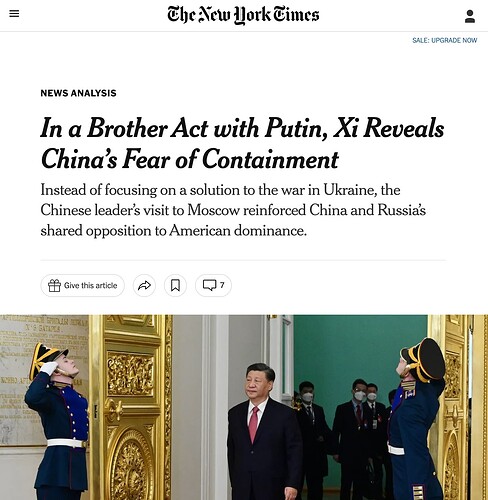-
中国领导人习近平本周飞抵莫斯科,讨论乌克兰的和平问题,然而,与俄罗斯总统弗拉基米尔-普京的峰会表明,他的首要任务是巩固与莫斯科的关系,以抵御美国。两位领导人发誓,作为政治、外交、经济和军事伙伴,他们将坚定不移地团结一致。峰会表明,习近平有意巩固北京对莫斯科的倾斜,反对美国对中国的 “遏制”。
-
关于乌克兰的讨论被九点联合声明所掩盖,该声明涵盖了从台湾到气候变化以及与蒙古关系的所有内容,经常将美国描绘成一个更好、更公平的世界的障碍。中国关于结束乌克兰战争的建议出现在他们联合声明的最后一节,并警告西方国家要解决危机。两位领导人谈到了加强经济合作和吸引更多中国投资者到俄罗斯的计划。
-
习近平和普京宣布他们钦佩对方的独裁统治,习近平支持普京再次执政。虽然习近平试图表明中国对俄罗斯的承诺,但他没有给普京开出一张支持的空白支票。中国还调整了用于描述其与俄罗斯关系的语言,避免重提 "无限的友谊 "的言论。
-
中国国家主席习近平认为,美国通过制裁和外交施压活动,对中国进行了 “全方位的遏制、包围和压制”。为了对抗这种情况,习近平希望给俄罗斯总统普京提供政治和经济支持,以确保他们的伙伴关系。安德鲁-斯莫尔(Andrew Small)是《无极限》(No Limits)的作者。The Inside Story of China’s War With the West "一书的作者认为,这是习近平提供政治支持的一个重要姿态。
-
中国官员曾表示,习近平将帮助促进俄罗斯和乌克兰之间的会谈,但模拟和平任务的情况比预期的要少。此前,日本首相岸田文雄访问基辅支持乌克兰,加深了中国的看法,即这场战争已经成为一场同样针对北京的全球竞赛。
-
随着中国与美国关系的恶化,与俄罗斯的牢固关系对中国来说变得更加关键。美国限制中国获得先进的半导体产品,并帮助澳大利亚建造核动力潜艇以对抗中国的军事增长,这使习近平对华盛顿的戒心更加强烈。习近平的 "全面遏制 "一词旨在总结 “减缓中国增长的努力,阻止其获得尖端技术,并侵蚀中国与周边国家的关系”。
-
中国国家机构和中国人民解放军的分析家们认为,乌克兰冲突是美国领导的重新确立其全球主导地位的努力的一部分。中国也是这一战略的目标,因此,习主席在基辅和莫斯科之间进行调解的意愿可能是有限的。
-
中国和俄罗斯发表了一份联合声明,其中批评了北约,并认为他们的关系是优越的,因为它是 “成熟、稳定、独立和有弹性的”。中国的官方通讯社,新华社,也解释了为什么这两个国家不想建立一个正式联盟。
-
尽管有官方声明,一些读者认为,俄罗斯和中国之间的关系本质上是一种联盟。
-
China’s leader, Xi Jinping, flew into Moscow this week to discuss peace in Ukraine, however, the summit with President Vladimir V. Putin of Russia demonstrated that his priority was shoring up ties with Moscow to gird against the United States. The two leaders vowed ironclad solidarity as political, diplomatic, economic and military partners. The summit showed Mr. Xi’s intention to entrench Beijing’s tilt towards Moscow against U.S. “containment” of China.
-
Talk of Ukraine was overshadowed by the nine-point joint statement that covered everything from Taiwan to climate change and relations with Mongolia, often depicting the United States as the obstacle to a better, fairer world. China’s proposal to end the war in Ukraine appeared in the last section of their joint statement and warned Western countries of a settlement to the crisis. The leaders talked up plans to enhance economic cooperation and draw more Chinese investors to Russia.
-
Mr. Xi and Mr. Putin declared their admiration for each other’s authoritarian rule, with Mr. Xi endorsing Mr. Putin for another term in power. While Mr. Xi sought to show China’s commitment to Russia, he stopped short of writing Mr. Putin a blank check of support. China also calibrated the language used to describe its relationship with Russia, avoiding reviving the rhetoric of “limitless friendship”.
-
Chinese President Xi Jinping has viewed the US as engaging in an “all-around containment, encirclement and suppression of China” through a campaign of sanctions and diplomatic pressure. To counteract this, Xi wants to give Russian President Putin the political and economic support to secure their partnership. Andrew Small, author of “No Limits: The Inside Story of China’s War With the West”, believes that this is a significant gesture of political support from Xi.
-
Chinese officials had indicated that Xi would help promote talks between Russia and Ukraine, but there was less of a simulation of a peace mission than expected. This comes as Prime Minister Fumio Kishida of Japan visited Kyiv to support Ukraine, deepening Chinese views that the war has become a global contest also aimed at Beijing.
-
Strong relations with Russia have become more crucial to China as its ties with the US have deteriorated. US restrictions on Chinese access to advanced semiconductors and moves to help Australia build nuclear-powered submarines to counter China’s military growth have hardened Xi’s wariness of Washington. Xi’s term of “all-around containment” is intended to summarize “an effort to slow Chinese growth, block its access to cutting-edge technologies, and to erode China’s ties with neighboring countries”.
-
Chinese state institutes and People’s Liberation Army analysts believe the Ukraine conflict is part of a US-led effort to reassert its global dominance. China is also a target of this strategy, and therefore President Xi’s willingness to mediate between Kyiv and Moscow is likely to be limited.
-
China and Russia issued a joint statement in which they criticized NATO and held up their relationship as superior because it is “mature, stable, independent and resilient”. China’s official news agency, Xinhua, also explained why the two countries would not want to establish a formal alliance.
-
Despite the official statements, some readers argued that the relationship between Russia and China is essentially an alliance.
1 Like
No fear no future.
